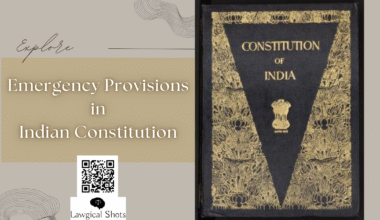The Mediation Act 2023 is a significant legislative framework to facilitate and promote mediation, especially institutional mediation, for the settlement of civil and commercial disputes amicably between the parties. It is an effective alternative to litigation, aiming at reducing the burdens on the Court and encouraging a culture of negotiation and dialogue. Let’s take a deep dive into mediation and how the legislation lays makes it an effective mode of alternative dispute resolution.
What is Mediation?
Mediation is an alternative dispute resolution method in which parties attempt to reach a mutually amicable settlement of their dispute with the help of a third party, referred to as a mediator. Mediation is not a new concept in India. It has been in existence since ancient times in the form of “Panchayat”, where disputes were resolved through third-party intervention, primarily by the decision-making authority of that village.
Section 89 (1) of the Code of Civil Procedure, 1908, outlines the settlement of disputes outside the Court through arbitration, conciliation, judicial settlement, or mediation. This has been widely recognized and applied by the Court. Despite this, private mediation lacked structure and legal recognition. To overcome this challenge, the Mediation Act 2023 was enacted to strengthen the mediation practice and establish a clear legal framework.
Rationale behind the Mediation Act, 2023
- To provide a legal framework: This Act provides statutory status to the Mediation Act to bring clarity and uniformity in rules, procedures, or processes which was lacking earlier. Mediated Settlement Agreements are legally enforceable, like a Court decree.
- Reduction in Court backlog: By encouraging pre-litigation mediation in certain civil and commercial cases, it will prevent disputes from escalating into prolonged legal battles. It will also help in reducing the backlog before the Court and promote the speedy disposal of the cases.
- Promoting access to justice: The Act aims to provide a cost-effective and time-efficient mechanism for resolving disputes, making justice more accessible to the people.
Key Provisions of the Mediation Act
- Applicability and Scope
The Mediation Act 2023 shall apply to mediation conducted in India:
Domestic mediation: All the parties habitually reside in or are incorporated in or have a place of business in India.
International mediation: The Act also apply in case of an international matter, where one of the parties habitually resides in India and the other outside the country, but the process of mediation is conducted in India.
Disputes between the government and private party: This Act would also be applicable between the two parties, where one party is the central/State government or an entity owned and controlled by the government, in case of commercial or any other disputes as notified.
- Pre-litigation mediation
Pre-litigation mediation is the process through which the parties voluntarily and with mutual consent take steps to settle disputes with the help of a mediator before filing litigation in Court in civil and commercial matters.
- Mediation Agreement
A mediation agreement is a written document, whether incorporated in the form of a clause in the contract or a separate agreement, signed by both parties. The written document includes:
a) any document signed by parties;
b) any document which is electronically communicated among the parties and signed digitally, provided under the Information Technology Act 2000;
c) in case of any pleading or suit where one party alleged the existence of the mediation agreement, not denied by the other party.
- Power of Courts to refer parties to mediation
Any court or tribunal at any stage of proceedings has the power to refer parties to mediation, whether mediation is mentioned in the agreement or not.
- Appointment of Mediator
Either the Parties may mutually appoint mediators, including a foreign mediator, meeting the specific qualification requirement, or he may be appointed by the Mediator Service provider within 7 days of the application being received.
- Territorial jurisdiction
Every mediation under this Act shall be conducted within the territorial jurisdiction of the competent Court/Tribunal. However, it may also be conducted at any place outside the territorial jurisdiction, provided that this is done with the mutual consent of the parties. Parties may also conduct mediation proceedings online, provided the parties agree to do so by written consent.
- Timeline for Mediation
The mediation shall be completed within a period of one hundred and twenty days (120) from the date fixed for the first appearance before the mediator. The period for mediation may be further extended as agreed by the parties for sixty (60) days.
- Mediated Settlement Agreement
A Mediated Settlement Agreement is an agreement in writing, authenticated by a mediator, and signed by both parties, once the mediation is concluded. The decision is final and binding on the party. It is enforceable in the same manner as a Court decree.
- Ground for challenge
A Mediated Settlement Agreement can be challenged within 90 (ninety) days before the competent court on the following grounds:
- Fraud
- Corruption
- Impersonation
- If the dispute’s subject matter was not fit for the mediation, for example, (criminal cases or cases where a minor is involved).
Confidentiality in Mediation
The mediator, the parties, and participants shall keep all the information confidential in the mediation proceedings, namely:
- Acknowledgements, opinions, suggestions, promises, proposals, apologies, and admission made during the proceedings;
- Documents prepared solely for mediation;
- Acceptance of, willingness to accept proposals, made or exchanged in mediation;
- Any other mediation communication.
No audio, video recording during the proceeding shall be made by the parties. All the participants, parties, mediator, or mediator service provider shall maintain the confidentiality of the proceeding throughout. No party shall introduce this information or communication aforesaid as evidence before any court or tribunal.
Establishment of Mediation Counci
The Mediation Council is established to fulfil the following duties under thisAct:
- Promote domestic and international mediation in India through proper guidelines.
- Develop India as a robust centre for mediation, domestic and international.
- Lay down standards for professional and ethical conduct of mediators and maintain a database.
- Accredit mediators and institutions.
- Provide for the manner of the conduct of the mediation proceedings.
- Maintain an electronic depository of the mediated settlement agreements made in India and other such records related thereto.
Conclusion
The Mediation Act of 2023 is a landmark legislation in the history of Alternative Dispute Resolution, providing statutory status to Mediation as an alternative to litigation for civil and commercial disputes. It will not only help in resolving disputes speedily, but also encourage communication and negotiation as a way of settling disputes, which is going to be highly effective in the coming time. The Mediation Act comprehensively covers every facet of mediation from the appointment of a mediator to the establishment of the mediation council, provision for pre-litigation mediation, mediated settlement agreement, confidentiality, and enforcement of the agreement, etc. If executed properly, it would transform India’s dispute resolution system, making it more efficient, inclusive, and aligned with the best global practice.
The Mediation Act of 2023 has been summarised by our intern, Ms Neha Patidar. She has been assisting the team in bringing informational legal blogs.








